Syndecan-3 is selectively pro-inflammatory in the joint and contributes to antigen-induced arthritis in mice, Arthritis Research & Therapy
Por um escritor misterioso
Last updated 09 abril 2025
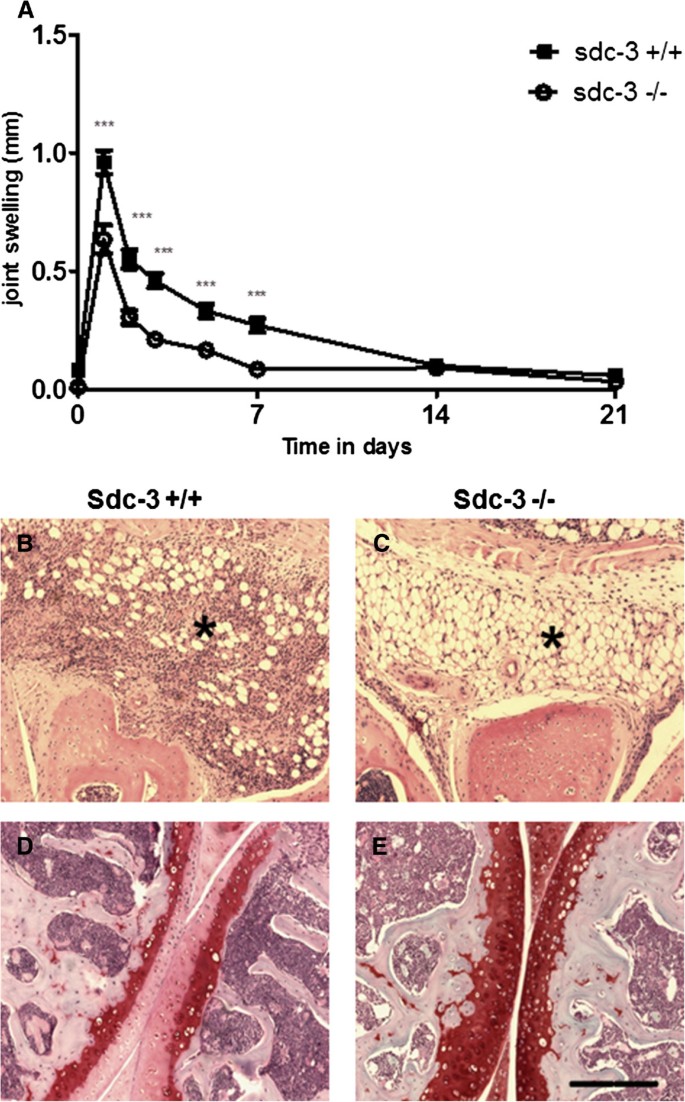
Introduction Syndecans are heparan sulphate proteoglycans expressed by endothelial cells. Syndecan-3 is expressed by synovial endothelial cells of rheumatoid arthritis (RA) patients where it binds chemokines, suggesting a role in leukocyte trafficking. The objective of the current study was to examine the function of syndecan-3 in joint inflammation by genetic deletion in mice and compare with other tissues. Methods Chemokine C-X-C ligand 1 (CXCL1) was injected in the joints of syndecan-3−/−and wild-type mice and antigen-induced arthritis performed. For comparison chemokine was administered in the skin and cremaster muscle. Intravital microscopy was performed in the cremaster muscle. Results Administration of CXCL1 in knee joints of syndecan-3−/−mice resulted in reduced neutrophil accumulation compared to wild type. This was associated with diminished presence of CXCL1 at the luminal surface of synovial endothelial cells where this chemokine clustered and bound to heparan sulphate. Furthermore, in the arthritis model syndecan-3 deletion led to reduced joint swelling, leukocyte accumulation, cartilage degradation and overall disease severity. Conversely, CXCL1 administration in the skin of syndecan-3 null mice provoked increased neutrophil recruitment and was associated with elevated luminal expression of E-selectin by dermal endothelial cells. Similarly in the cremaster, intravital microscopy showed increased numbers of leukocytes adhering and rolling in venules in syndecan-3−/−mice in response to CXCL1 or tumour necrosis factor alpha. Conclusions This study shows a novel role for syndecan-3 in inflammation. In the joint it is selectively pro-inflammatory, functioning in endothelial chemokine presentation and leukocyte recruitment and cartilage damage in an RA model. Conversely, in skin and cremaster it is anti-inflammatory.

Fibroblasts and Fibroblast-like Synoviocytes

The potential remedy of melatonin on osteoarthritis - Lu - 2021 - Journal of Pineal Research - Wiley Online Library
Antirheumatic treatment is associated with reduced serum Syndecan-1 in Rheumatoid Arthritis

Proteome Profiler Human Cytokine Array Kit ARY005B: R&D Systems
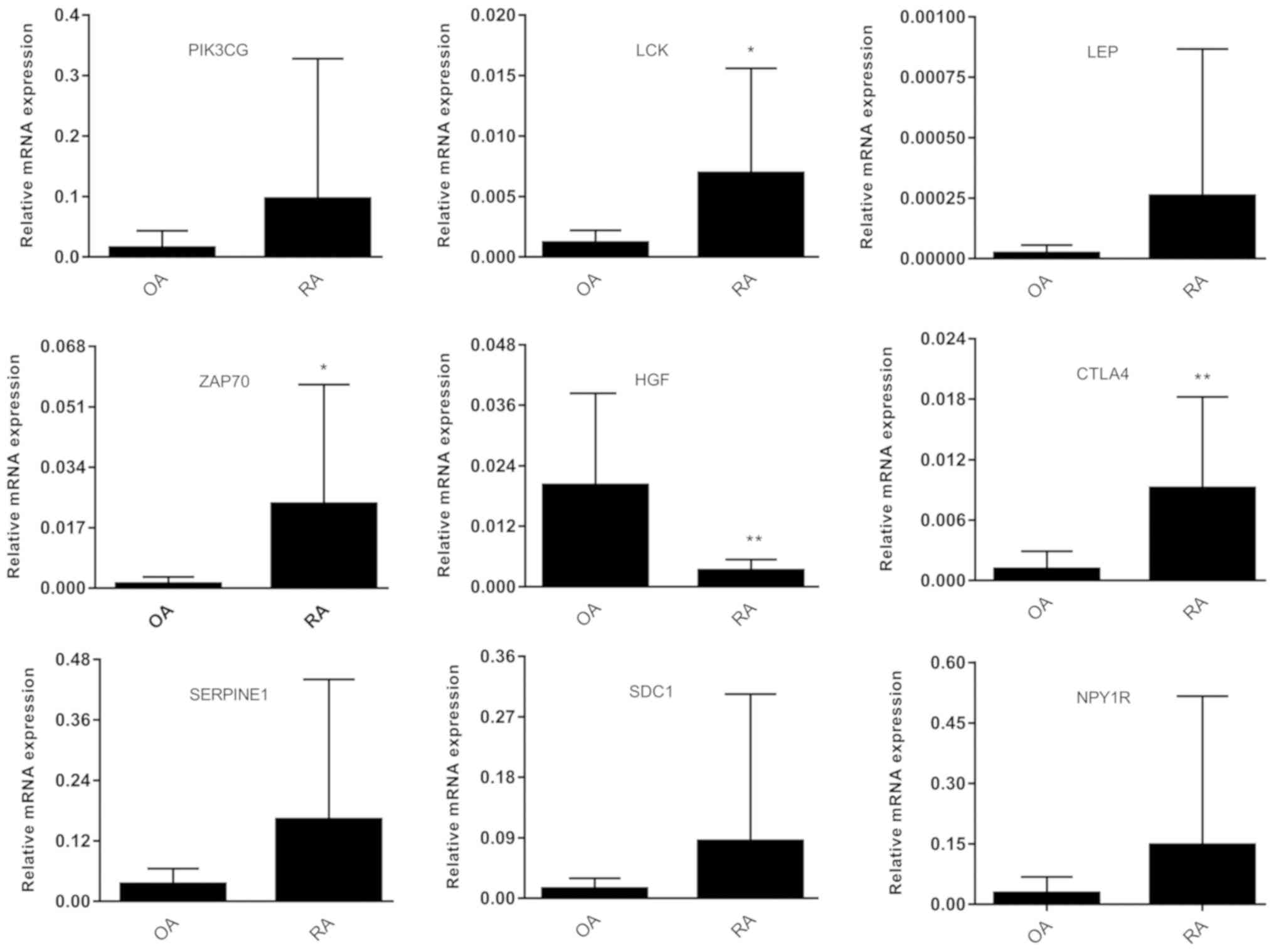
Identification of pivotal genes and pathways in the synovial tissue of patients with rheumatoid arthritis and osteoarthritis through integrated bioinformatic analysis
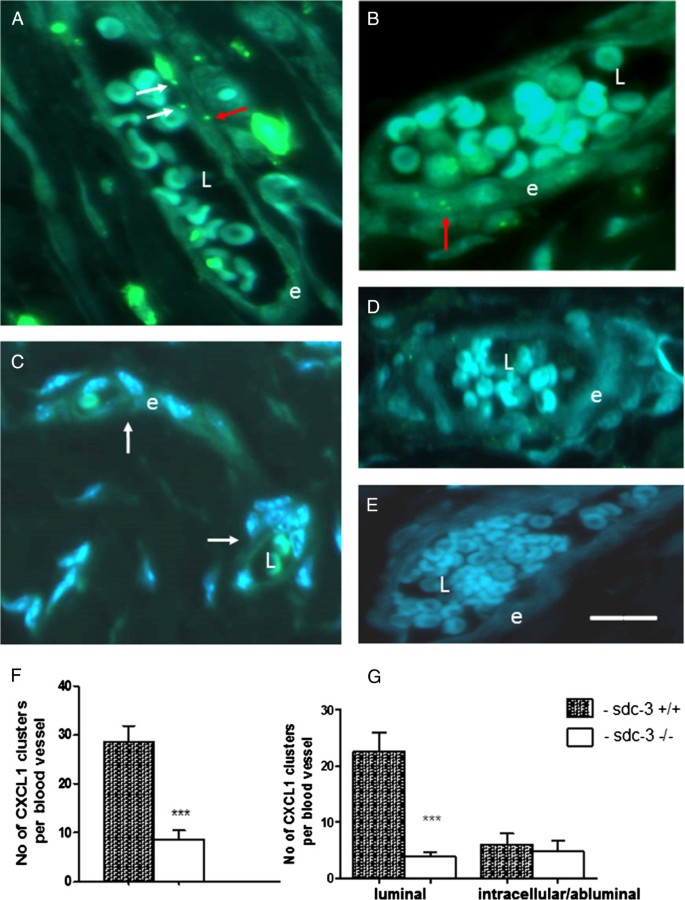
Syndecan-3 is selectively pro-inflammatory in the joint and contributes to antigen-induced arthritis in mice, Arthritis Research & Therapy
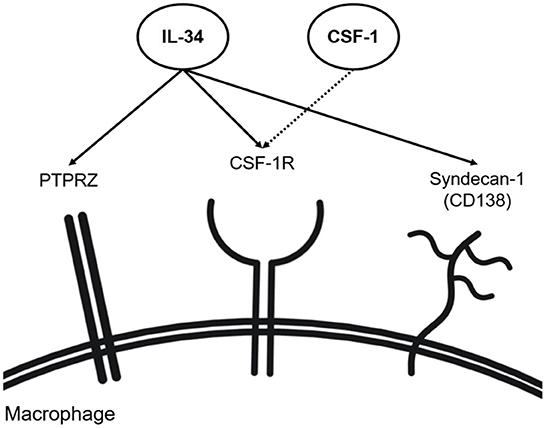
Frontiers Interleukin-34-regulated T-cell responses in rheumatoid arthritis
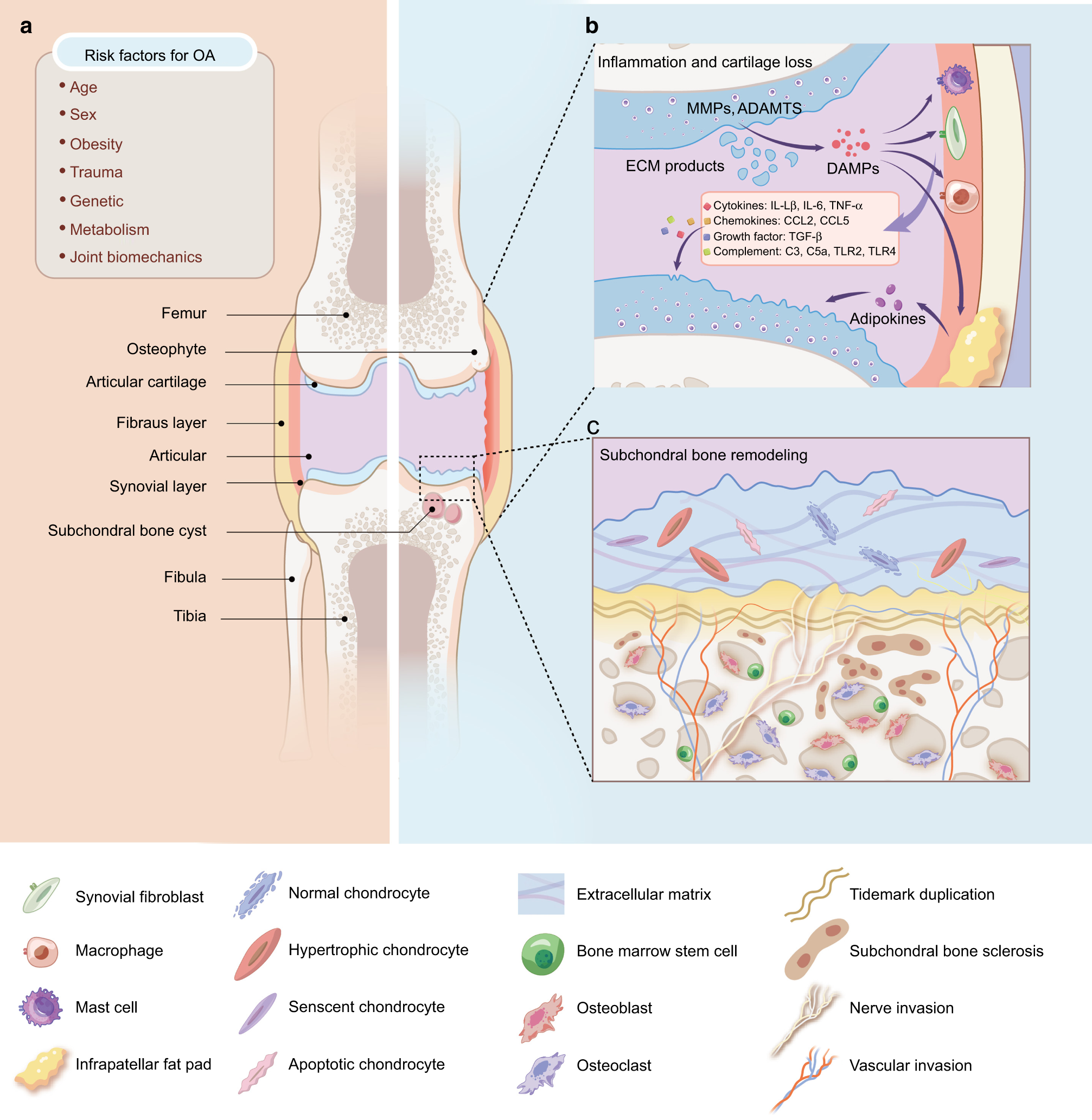
Exosomes rewire the cartilage microenvironment in osteoarthritis: from intercellular communication to therapeutic strategies

Secondary structure prediction of syndecan-3 core protein. N-terminal

JCI - Dynamic transcriptome analysis unveils key proresolving factors of chronic inflammatory arthritis
Recomendado para você
-
scariestmedia #brendanreviews #disturbingmovieiceberg #disturbingmovi09 abril 2025
-
 CapCut_md pope movie09 abril 2025
CapCut_md pope movie09 abril 2025 -
 The Two Popes - Wikipedia09 abril 2025
The Two Popes - Wikipedia09 abril 2025 -
 Dado Milman - Important MP3 Download & Lyrics09 abril 2025
Dado Milman - Important MP3 Download & Lyrics09 abril 2025 -
 L'Auberge Espagnole - 2 DVD - Romain Duris - Cecile Of France - Judith Godrèche09 abril 2025
L'Auberge Espagnole - 2 DVD - Romain Duris - Cecile Of France - Judith Godrèche09 abril 2025 -
 Insect Infestation Increases Viscosity of Biogenic Secondary Organic Aerosol09 abril 2025
Insect Infestation Increases Viscosity of Biogenic Secondary Organic Aerosol09 abril 2025 -
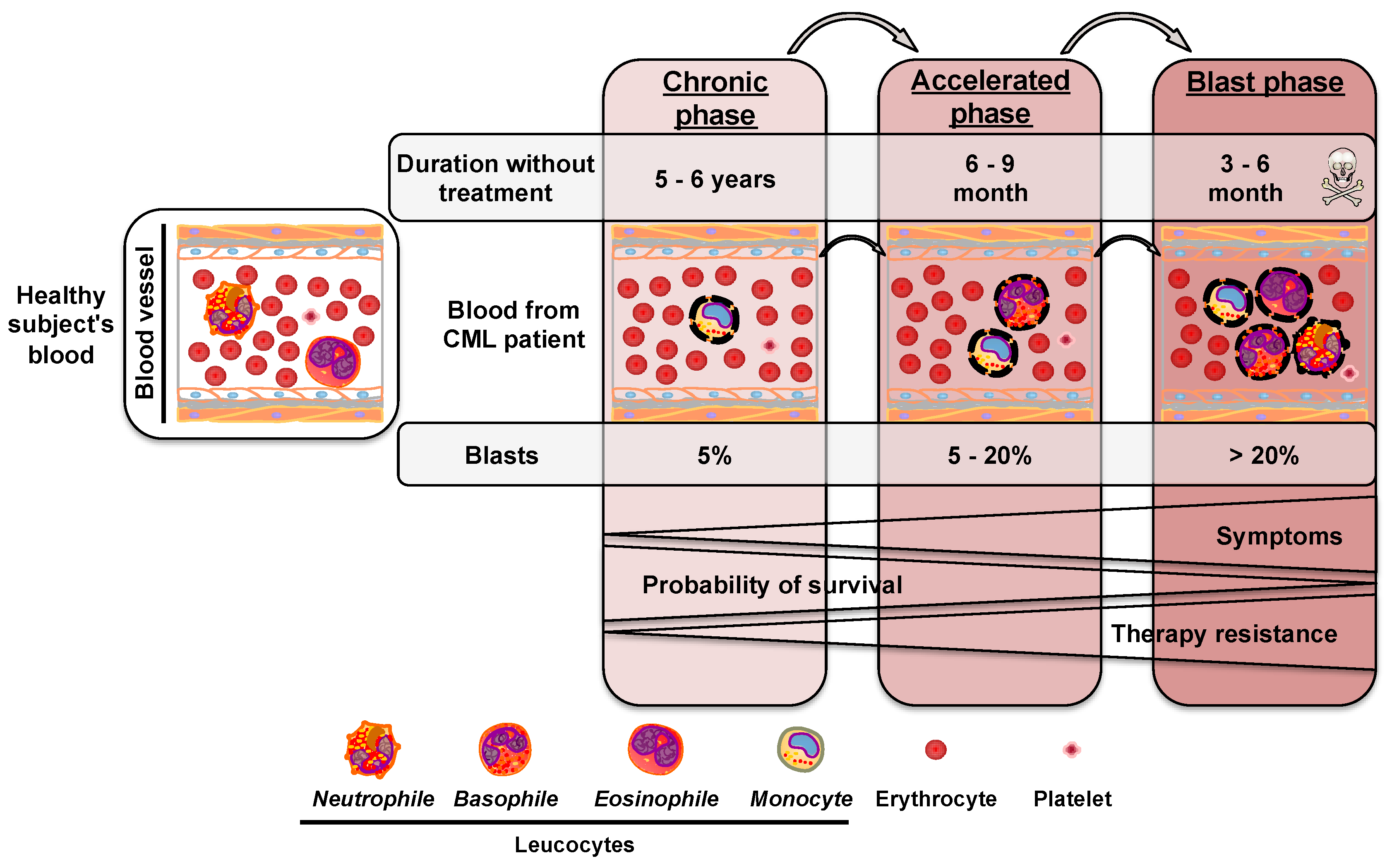 Cancers, Free Full-Text09 abril 2025
Cancers, Free Full-Text09 abril 2025 -
 Wai-Kwan Alfred Yung MD Anderson Cancer Center09 abril 2025
Wai-Kwan Alfred Yung MD Anderson Cancer Center09 abril 2025 -
 Exhumation – Song by MDPOPE – Apple Music09 abril 2025
Exhumation – Song by MDPOPE – Apple Music09 abril 2025 -
 Rapid Redox Cycling of Fe(II)/Fe(III) in Microdroplets during Iron–Citric Acid Photochemistry09 abril 2025
Rapid Redox Cycling of Fe(II)/Fe(III) in Microdroplets during Iron–Citric Acid Photochemistry09 abril 2025
você pode gostar
-
Buy Cooking Simulator: Cakes & Cookies DLC09 abril 2025
-
 hack// G.u. 4: Novel: Tatsuya Hamazaki, Yuzuka Morita: 9781427815255: : Books09 abril 2025
hack// G.u. 4: Novel: Tatsuya Hamazaki, Yuzuka Morita: 9781427815255: : Books09 abril 2025 -
 Venture é o primeiro herói não binário de Overwatch 209 abril 2025
Venture é o primeiro herói não binário de Overwatch 209 abril 2025 -
 Ben10 Alien Force Fanart By Nefta3007 : r/Ben1009 abril 2025
Ben10 Alien Force Fanart By Nefta3007 : r/Ben1009 abril 2025 -
 Rate this hilarious 2.6 mega knight deck that works at 6300ish trophies : r/ ClashRoyale09 abril 2025
Rate this hilarious 2.6 mega knight deck that works at 6300ish trophies : r/ ClashRoyale09 abril 2025 -
 Paper.io 2 World Conflict ▻ score: 1688 ◅▻ players killed: 32 ◅▻ NEW 2020 ◅▻ Paper-io.com09 abril 2025
Paper.io 2 World Conflict ▻ score: 1688 ◅▻ players killed: 32 ◅▻ NEW 2020 ◅▻ Paper-io.com09 abril 2025 -
 SOLUTION: You uploaded an APK with an invalid signature - digest09 abril 2025
SOLUTION: You uploaded an APK with an invalid signature - digest09 abril 2025 -
 Poppy Playtime Capítulo 3 precisa de um monstro tão bom quanto09 abril 2025
Poppy Playtime Capítulo 3 precisa de um monstro tão bom quanto09 abril 2025 -
 Wallpaper engine alternative!! animated wallpaper free09 abril 2025
Wallpaper engine alternative!! animated wallpaper free09 abril 2025 -
 Link Nonton Anime Jigokuraku Episode 1 Sub Indo di Mana? Streaming Hell's Paradise di Sini Bukan di Anoboy - Suara Merdeka Jogja09 abril 2025
Link Nonton Anime Jigokuraku Episode 1 Sub Indo di Mana? Streaming Hell's Paradise di Sini Bukan di Anoboy - Suara Merdeka Jogja09 abril 2025

